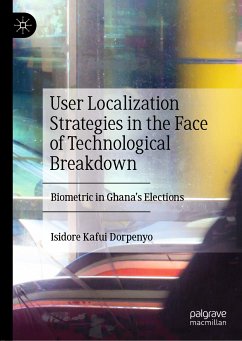-Godwin Agboka, Associate Professor of Technical Communication, University of Houston-Downtown, USA
User Localization Strategies in the Face of Technological Breakdown is a nuanced, insightful text that will be useful to technical communication researchers interested in theories and methodologies of localization, biometrics, and cross-cultural technical communication. A much-needed perspective from an important community that can completely transform the ways in which technical communicators think about technology design in both local and global contexts. This book makes powerful interventions in current conversations about decolonizing technical communication through social justice work.
-Laura Gonzales, Assistant Professor of Rhetoric and Writing Studies at The University of Texas at El Paso, USA, and author of Sites of Translation: What Multilinguals Can Teach Us About Digital Writing and Rhetoric¿
Dorpenyo's work provides technical communicators with a deep and very privileged look into the fascinating world of technology transfer in Ghana. The story he tells of how biometrics were adapted by Ghana's election officials and voters is a case study for how to conduct analyses of "user localization strategies" for our field.
-Tharon W. Howard, Professor of Professional Communication and Rhetoric and Director of the Usability Testing Facility, Clemson University, USA
Dr. Dorpenyo's unique perspective and robust analysis of the adoption and use of biometric in Ghana's elections illustrates how users adapted this technology for their social, cultural, physical, and political contexts using linguistic, subversive, and user-heuristic localizations. This work, situated at the intersections of technical communication, civic engagement, social justice, user experience, and localization earns its significance by pointing out the importance of election technologies in non-western cultures and providing us with rhetorical localization strategies to consider within cultural technical communication.
-Michelle F. Eble, Associate Professor of Technical and Professional Communication, East Carolina University, USA
This book examines Ghana's use of the fingerprint biometric technology in order to further conversations about localization championed by technical communication scholars. Localization, in this case, refers to the extent to which users demonstrate their knowledge of use by subverting and reconfiguring the purpose of technology to solve local problems. Dorpenyo argues that the success of a technology depends on how it meets the users' needs and the creative efforts users put into use situations. In User Localization Strategies in the Face of Technological Breakdown, Dorpenyo advocates studying how users of technological systems construct knowledge about the technology and develop local strategies to solve technological breakdowns. By analyzing technical documents and interview transcripts, the author identifies and advances three user localization strategies: linguistic localization, subversive localization, and user-heuristic experience localization, and considers how biometric systems can become a tool of marginalization.
Dieser Download kann aus rechtlichen Gründen nur mit Rechnungsadresse in A, B, BG, CY, CZ, D, DK, EW, E, FIN, F, GR, HR, H, IRL, I, LT, L, LR, M, NL, PL, P, R, S, SLO, SK ausgeliefert werden.









